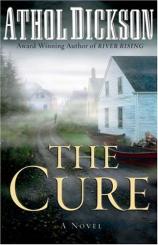The Cure
Review
The Cure
Athol Dickson is one of Christian suspense’s best writers, and his latest spooky thriller, THE CURE, continues his tradition of excellence.
Crowds of homeless people are descending on the small town of Dublin, Maine, where the rumor of a magic cure for alcoholism is rumored to be obtainable. Former pastor and now alcoholic homeless man Riley Keep is drawn back to his old hometown in hopes of finding the cure for himself and his friend, Brice, who is close to dying from booze. Riley has fallen far from his past successful life as a minister and college professor, father and husband. At one point he ponders over being able to “go from mourning for his friend and longing for his wife and child to lusting for good whiskey in the time it took to sing a hymn.”
Riley and Brice land at a homeless shelter in Dublin run by Willa Newdale, a woman with secrets of her own. Although Riley strives to remain anonymous, it’s not long before he’s recognized. When a cure for alcoholism falls into his hands, chaos is not far behind. How should Riley responsibly handle “the cure?” Should there be a charge for it? And will everyone he trusts to manufacture and market the drug be as ethical as he is? Of course not, and as things begin to unravel, the reader becomes more and more deeply immersed in Riley’s back story, much of which originated in a Brazilian village and is doled out to the reader in doses just large enough to keep the pages turning. More trouble: If someone takes “the cure” and then has another drink, they’ll plunge into a deeper addiction than they had before.
Meanwhile, Hope, the mayor of Dublin who has a soon-to-be-disclosed link to Riley, has her own set of problems, including as many as 600 homeless wandering the streets of her small community. She reflects, “So on top of everything else --- half the downtown businesses closing, population shrinking, lobsters vanishing, costly gifts from who knows whom for who knows what reason and all the painful memories Riley’s return had thrust upon her --- on top of all of that had come this plague of biblical proportions.”
Dickson adeptly handles his Maine setting, capturing the idioms and idiosyncrasies of its inhabitants. His characters are original and multifaceted, and sometimes perplexing. Why, for example, would Hope remain committed to her marriage? We’re astounded, yet we believe it when Dickson tells us she does and shows us through her character why. The plot is intriguing and fresh, and as he did in RIVER RISING and THEY SHALL SEE GOD, Dickson creates a series of twists and turns that continue surprising readers through the very last pages.
What is more difficult to quantify is Dickson’s amazing ability to create a chilling atmosphere. Daphne Du Maurier’s REBECCA comes to mind; readers will feel the tension through the final paragraph. If Alfred Hitchcock was still alive, he’d be banging down Dickson’s door to make movies of his novels. (Think of what Hitchcock could do with the scenes of homeless people gradually moving in on the small Maine town!)
The symbolic use of communion in Riley’s battle with addiction, the incredible commitment of Hope, the question of ethics and causes of alcoholism, and the tireless giving of Willa are all deeper invitations to investigate aspects of faith, relationships and life than readers discover in the usual Christian fiction fare. This is a must-read novel for anyone interested in inspirational fiction. And even those who don’t usually read the genre will want to give it a look.
Reviewed by Cindy Crosby on July 1, 2007




